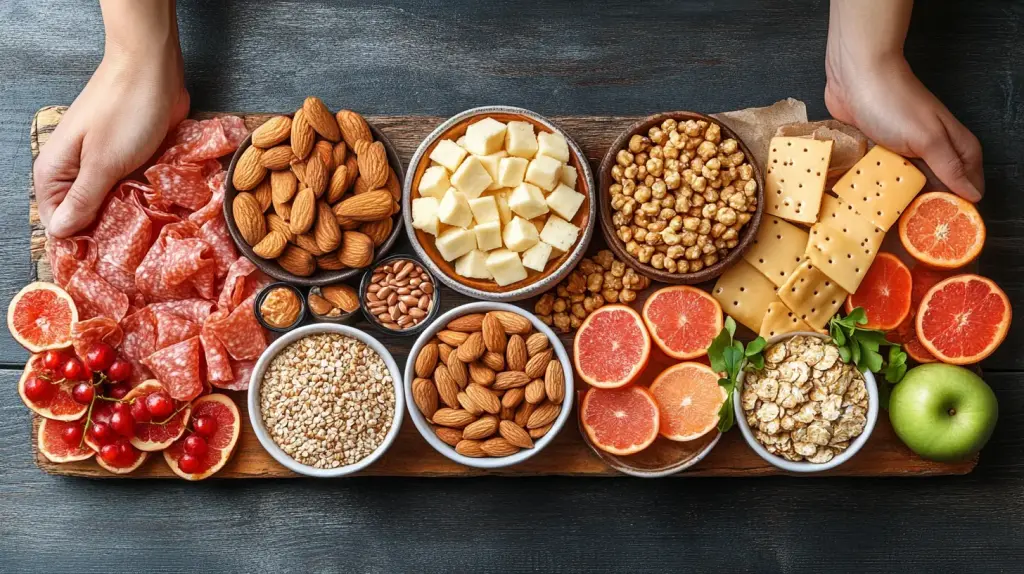-
×
 No-spa pills 40mg, 64pcs
$22.0
No-spa pills 40mg, 64pcs
$22.0
Balance of potassium, magnesium, Metabolism
Best Breakfast Choices for Optimal Mineral Health
A nutritious breakfast is essential for maintaining overall health and well-being, particularly when it comes to ensuring optimal mineral intake. Minerals play a crucial role in various bodily functions, from building strong bones and teeth to regulating muscle and nerve function. However, with the abundance of breakfast options available, it can be challenging to determine which choices best support our mineral needs.
In this article, we will explore the importance of minerals in human health and identify the key minerals essential for optimal well-being. We will discuss nutrient-dense breakfast foods, ideal food combinations for maximum mineral absorption, and preparation techniques that preserve mineral content. Additionally, we will address specific mineral needs for various life stages and provide strategies for overcoming common challenges in incorporating mineral-rich foods into your breakfast routine. By the end of this article, you will be equipped with the knowledge and tools necessary to make informed breakfast choices that support your body’s mineral requirements.
The Importance of Minerals in Human Health
Minerals are inorganic substances that play a vital role in maintaining human health. These essential nutrients are required for various bodily functions, including the formation of bones and teeth, regulation of muscle and nerve function, and production of hormones and enzymes.[1] Without an adequate intake of minerals, our bodies may struggle to perform optimally, leading to potential health issues.
Essential Minerals for Bodily Functions
There are two categories of minerals: macrominerals and trace minerals. Macrominerals, such as calcium, magnesium, and potassium, are needed in larger amounts, while trace minerals, like iron, zinc, and selenium, are required in smaller quantities. Despite the differences in required amounts, both types of minerals are equally important for maintaining health.
For example, calcium is essential for building and maintaining strong bones and teeth, while also playing a role in muscle contraction and nerve function. Iron, on the other hand, is crucial for the production of hemoglobin, a protein in red blood cells that carries oxygen throughout the body.[2]
Consequences of Mineral Deficiencies
Mineral deficiencies can lead to a wide range of health problems. A lack of calcium can result in weakened bones and an increased risk of osteoporosis, while an iron deficiency can cause anemia, characterized by fatigue, weakness, and pale skin.[3] Other mineral deficiencies may contribute to impaired immune function, poor wound healing, and even developmental delays in children.
Warning
Mineral deficiencies can have serious health consequences, so it’s important to ensure you’re getting enough essential minerals through your diet or supplements.
Factors Affecting Mineral Absorption
Several factors can influence the body’s ability to absorb minerals from the foods we eat. These include:
- The presence of certain compounds, such as phytates and oxalates, which can bind to minerals and reduce their absorption
- The balance of other nutrients in the diet, as some minerals compete for absorption
- An individual’s age, health status, and digestive function
The Role of Breakfast in Daily Mineral Intake
Breakfast is an important meal for ensuring adequate mineral intake throughout the day. By choosing nutrient-dense breakfast foods and combining them strategically, you can optimize your body’s ability to absorb and utilize essential minerals. In the following sections, we will explore the best breakfast choices for optimal mineral health and provide practical strategies for incorporating these foods into your daily routine.
Key Minerals for Optimal Health
To maintain optimal health, it is crucial to ensure an adequate intake of essential minerals. In this section, we will discuss five key minerals that play vital roles in various bodily functions: calcium, iron, magnesium, zinc, and potassium.
Calcium
Calcium is well-known for its role in building and maintaining strong bones and teeth. However, it also plays a crucial role in muscle contraction, nerve function, and blood clotting. Adequate calcium intake is essential throughout life, particularly during periods of growth and development, such as childhood and adolescence, and later in life to prevent age-related bone loss.[4]
Iron
Iron is essential for the production of hemoglobin, a protein in red blood cells that carries oxygen throughout the body. It also plays a role in energy metabolism and immune function. Iron deficiency is the most common nutritional deficiency worldwide, particularly affecting women of reproductive age, pregnant women, and young children.[5]
Magnesium
Magnesium is involved in over 300 enzymatic reactions in the body, including energy production, protein synthesis, and muscle and nerve function. It also plays a role in regulating blood sugar levels and supporting cardiovascular health. Magnesium deficiency has been linked to various health issues, such as type 2 diabetes, hypertension, and migraines.
Important
Magnesium is often referred to as the “anti-stress” mineral due to its role in promoting relaxation and supporting healthy sleep patterns.
Zinc
Zinc is crucial for immune function, wound healing, and growth and development. It also plays a role in taste and smell perception, as well as supporting reproductive health. Zinc deficiency can lead to impaired immune function, delayed wound healing, and growth retardation in children.
Potassium
Potassium is an essential electrolyte that helps regulate fluid balance, muscle contractions, and nerve signals. It also plays a role in maintaining healthy blood pressure levels and supporting cardiovascular health. Adequate potassium intake has been linked to a reduced risk of stroke, hypertension, and kidney stones.[6]
By ensuring an adequate intake of these key minerals through a well-balanced diet and targeted breakfast choices, you can support optimal health and prevent the potential consequences of mineral deficiencies. In the next section, we will explore nutrient-dense breakfast foods that can help you meet your daily mineral requirements.

Nutrient-Dense Breakfast Foods
Incorporating nutrient-dense foods into your breakfast routine is an excellent way to ensure you’re meeting your daily mineral requirements. In this section, we’ll explore a variety of breakfast foods that are rich in essential minerals, providing you with the building blocks for optimal health.
Whole Grains
Whole grains, such as oats, quinoa, and whole-grain bread, are excellent sources of minerals like magnesium, zinc, and iron. For example, a half-cup of cooked oats provides 13% of the daily value (DV) for zinc and 12% of the DV for iron.[7] Incorporating whole grains into your breakfast routine can help you start the day with a nutrient-dense foundation.
Leafy Greens
Leafy greens, such as spinach, kale, and collard greens, are packed with essential minerals like calcium, iron, and potassium. One cup of cooked spinach contains 24% of the DV for calcium and 36% of the DV for iron.[8] Adding leafy greens to your breakfast omelet or smoothie can significantly boost your mineral intake.
Tip
Pair leafy greens with vitamin C-rich foods, such as citrus fruits or bell peppers, to enhance iron absorption.
Nuts and Seeds
Nuts and seeds are nutrient powerhouses, providing an array of essential minerals like magnesium, zinc, and selenium. For example, a one-ounce serving of pumpkin seeds contains 37% of the DV for magnesium and 23% of the DV for zinc. Incorporating nuts and seeds into your breakfast, such as sprinkling them over oatmeal or adding them to smoothies, can help you meet your daily mineral needs.
Dairy and Fortified Dairy Alternatives
Dairy products, such as milk, yogurt, and cheese, are excellent sources of calcium, potassium, and other essential minerals. For those who follow a dairy-free diet, fortified plant-based milk alternatives, such as almond, soy, or oat milk, can also provide a significant amount of these minerals. One cup of fortified soy milk contains 45% of the DV for calcium and 13% of the DV for potassium.[9]
| Calcium | Iron | Magnesium | Zinc | |
|---|---|---|---|---|
| Oats (1/2 cup cooked) | 2% DV | 12% DV | 8% DV | 13% DV |
| Spinach (1 cup cooked) | 24% DV | 36% DV | 39% DV | 9% DV |
By incorporating a variety of these nutrient-dense foods into your breakfast routine, you can ensure that you’re providing your body with the essential minerals it needs to function optimally. In the next section, we’ll discuss how to strategically combine these foods to maximize mineral absorption.
Breakfast Combinations for Maximum Mineral Absorption
While consuming nutrient-dense foods is essential for meeting your daily mineral requirements, strategically combining these foods can enhance mineral absorption and optimize their health benefits. In this section, we’ll explore some breakfast combinations that can help maximize mineral absorption.
Iron-Rich Foods + Vitamin C
Iron is an essential mineral that plays a crucial role in oxygen transport and energy metabolism. However, the absorption of non-heme iron, found in plant-based foods, can be limited. To enhance iron absorption, pair iron-rich foods with vitamin C sources. For example, combine spinach with bell peppers in an omelet or add strawberries to your iron-fortified cereal.[10]
Calcium-Rich Foods + Vitamin D
Calcium is vital for building and maintaining strong bones and teeth. Vitamin D plays a key role in calcium absorption and helps regulate calcium levels in the body. To maximize calcium absorption, pair calcium-rich foods with vitamin D sources. For instance, enjoy a glass of fortified milk with a vitamin D-rich egg, or add canned fish like salmon to your breakfast sandwich.
Warning
Avoid consuming calcium-rich foods alongside iron-rich foods, as calcium can inhibit iron absorption.[11]
Zinc-Rich Foods + Protein
Zinc is crucial for immune function, wound healing, and growth and development. Protein can enhance zinc absorption by reducing the inhibitory effects of phytates, which are found in plant-based foods. Combine zinc-rich foods like pumpkin seeds with high-protein options such as Greek yogurt or add a sprinkle of nuts to your protein-rich breakfast smoothie.
Magnesium-Rich Foods + Healthy Fats
Magnesium plays a vital role in energy production, muscle and nerve function, and bone health. Consuming magnesium-rich foods alongside healthy fats can improve magnesium absorption and bioavailability. For example, add a tablespoon of almond butter to your magnesium-rich oatmeal, or enjoy a slice of avocado on whole-grain toast.[12]
| Mineral | Food Combination |
|---|---|
| Iron | Spinach omelet with bell peppers |
| Calcium | Fortified milk with a vitamin D-rich egg |
| Zinc | Greek yogurt with pumpkin seeds |
| Magnesium | Oatmeal with almond butter |
By strategically combining nutrient-dense foods in your breakfast meals, you can maximize mineral absorption and ensure that your body is receiving the essential nutrients it needs to function optimally. In the next section, we’ll provide practical tips and meal ideas for incorporating these mineral-rich breakfast combinations into your daily routine.

Breakfast Preparation Techniques
Incorporating nutrient-dense foods and strategic food combinations into your breakfast routine is essential for maximizing mineral absorption. However, the way you prepare your breakfast can also impact the bioavailability and retention of these essential nutrients. In this section, we’ll explore various breakfast preparation techniques that can help preserve the mineral content of your meals.
Gentle Cooking Methods
Cooking methods can significantly impact the mineral content of your food. To minimize mineral loss, opt for gentle cooking methods such as steaming, stir-frying, or sautéing. These methods help preserve the nutrient content of your ingredients while still allowing for the creation of delicious and satisfying breakfast meals.[13]
Tip
When boiling foods, use just enough water to cover the ingredients and consume the cooking liquid, as it often contains valuable dissolved minerals.
Soaking and Sprouting
Soaking and sprouting are traditional food preparation techniques that can enhance the bioavailability of minerals in plant-based foods. Soaking grains, legumes, and nuts overnight can help reduce the content of phytates, which are compounds that can inhibit mineral absorption. Sprouting takes this process a step further, activating enzymes that break down phytates and improve the overall digestibility of the food.[14]
Fermentation
Fermentation is another traditional food preparation method that can enhance the bioavailability of minerals in your breakfast foods. The process of fermentation involves the use of beneficial bacteria or yeasts to break down food components, resulting in improved digestibility and increased mineral absorption. Fermented breakfast foods like yogurt, kefir, and sourdough bread can be excellent additions to your mineral-rich morning routine.
Mindful Pairings
As discussed in the previous section, strategically combining foods can enhance mineral absorption. When preparing your breakfast, be mindful of these pairings to maximize the bioavailability of essential minerals. For example, pair iron-rich foods with vitamin C sources, calcium-rich foods with vitamin D, and zinc-rich foods with protein.[15]
| Technique | Description |
|---|---|
| Gentle Cooking | Steaming, stir-frying, or sautéing to preserve nutrient content |
| Soaking and Sprouting | Reducing phytate content and improving mineral bioavailability |
| Fermentation | Enhancing digestibility and mineral absorption |
| Mindful Pairings | Combining foods strategically to maximize mineral absorption |
By incorporating these breakfast preparation techniques into your morning routine, you can ensure that you’re not only consuming mineral-rich foods but also optimizing their absorption and bioavailability. In the next section, we’ll provide practical meal ideas and recipes that showcase these techniques and help you create delicious, nutrient-dense breakfast options.
Addressing Specific Mineral Needs
While a balanced, nutrient-dense breakfast can help meet the mineral needs of most individuals, some people may have specific requirements due to factors such as age, gender, or health conditions. In this section, we’ll explore how to address specific mineral needs through targeted breakfast choices.
Calcium for Bone Health
Calcium is crucial for maintaining strong bones and preventing conditions like osteoporosis. Women, in particular, have higher calcium requirements, especially after menopause. To address calcium needs, incorporate calcium-rich foods into your breakfast, such as dairy products, fortified plant-based milk alternatives, and leafy greens. Aim for 1,000-1,200 mg of calcium per day, depending on your age and gender.[16]
Iron for Women and Vegetarians
Iron is essential for oxygen transport and energy production. Women of childbearing age and those following vegetarian or vegan diets may be at a higher risk of iron deficiency. To address iron needs, include iron-rich foods in your breakfast, such as leafy greens, fortified cereals, and legumes. Pair these foods with vitamin C sources to enhance iron absorption. Women should aim for 18 mg of iron per day, while men require 8 mg.
Tip
Cooking with cast iron skillets can also help increase the iron content of your meals.[17]
Zinc for Immune Function
Zinc plays a vital role in immune function, wound healing, and growth and development. Older adults and those following plant-based diets may be at a higher risk of zinc deficiency. To address zinc needs, incorporate zinc-rich foods into your breakfast, such as nuts, seeds, whole grains, and fortified cereals. The recommended daily intake for zinc is 11 mg for men and 8 mg for women.
Magnesium for Stress Management
Magnesium is involved in over 300 enzymatic reactions in the body and plays a crucial role in energy production, muscle and nerve function, and stress management. Individuals under chronic stress may have higher magnesium requirements. To address magnesium needs, include magnesium-rich foods in your breakfast, such as leafy greens, nuts, seeds, and whole grains. The recommended daily intake for magnesium is 400-420 mg for men and 310-320 mg for women.[18]
| Mineral | Target Foods |
|---|---|
| Calcium | Dairy products, fortified plant-based milk alternatives, leafy greens |
| Iron | Leafy greens, fortified cereals, legumes |
| Zinc | Nuts, seeds, whole grains, fortified cereals |
| Magnesium | Leafy greens, nuts, seeds, whole grains |
By addressing specific mineral needs through targeted breakfast choices, you can ensure that your body receives the essential nutrients it requires for optimal health and function. In the next section, we’ll provide a summary of the key points covered in this article and offer final tips for creating a mineral-rich breakfast routine.

Overcoming Challenges in Mineral-Rich Breakfast Choices
While incorporating mineral-rich foods into your breakfast routine is essential for optimal health, it can sometimes be challenging due to factors such as time constraints, taste preferences, or dietary restrictions. In this section, we’ll explore strategies for overcoming these challenges and making mineral-rich breakfast choices more accessible and enjoyable.
Time-Saving Strategies
One of the most common barriers to preparing a nutrient-dense breakfast is lack of time.To overcome this challenge, try the following time-saving strategies:
- Prepare ingredients ahead of time: Chop vegetables, cook grains, or portion out nuts and seeds the night before to streamline your morning routine.
- Utilize leftovers: Incorporate leftover vegetables, proteins, or whole grains from previous meals into your breakfast.
- Choose quick-cooking options: Opt for quick-cooking grains like quinoa or oats, and use pre-washed, ready-to-eat leafy greens.
Taste and Texture Enhancements
Some mineral-rich foods may have strong flavors or unfamiliar textures that can be off-putting to some individuals. To make these foods more appealing, try the following strategies:
- Add natural sweeteners: Incorporate fresh or dried fruit, honey, or maple syrup to balance out the flavors of mineral-rich foods.
- Experiment with spices and herbs: Use aromatic spices and herbs to enhance the flavor and palatability of your breakfast dishes.[19]
- Combine textures: Pair crunchy nuts or seeds with creamy yogurt or smooth oatmeal to create a more satisfying and enjoyable texture.
Accommodating Dietary Restrictions
Dietary restrictions, such as food allergies, intolerances, or personal preferences, can sometimes limit the variety of mineral-rich foods available. To accommodate these restrictions, consider the following:
- Focus on nutrient-dense, whole-food options that align with your dietary needs.
- Explore alternative sources of minerals: For example, if you’re lactose intolerant, opt for fortified plant-based milk alternatives or leafy greens for calcium.
- Consult with a registered dietitian who can help you create a personalized plan that meets your unique needs and preferences.[20]
Tip
Be open to trying new foods and flavors. Expanding your palate can help you discover new mineral-rich breakfast options that you enjoy.
By implementing these strategies and maintaining a positive, open-minded approach to breakfast, you can successfully overcome challenges and make mineral-rich choices a consistent part of your morning routine. Remember, small changes can add up over time, leading to significant improvements in your overall health and well-being.
Implementing a Mineral-Optimized Breakfast Routine
Now that we’ve covered the importance of mineral-rich breakfast choices, key food groups, preparation techniques, and strategies for overcoming challenges, it’s time to put this knowledge into practice. In this section, we’ll provide practical tips and a sample meal plan to help you implement a mineral-optimized breakfast routine.
Practical Tips for Success
To successfully incorporate mineral-rich foods into your breakfast routine, consider the following tips:
- Start small: Gradually introduce new foods and flavors to avoid feeling overwhelmed or discouraged.
- Plan ahead: Take time each week to plan your breakfast meals, grocery shop, and prepare ingredients in advance.
- Be consistent: Aim to make mineral-rich breakfast choices a daily habit, even if your meals vary from day to day.[21]
- Listen to your body: Pay attention to how different foods make you feel and adjust your choices accordingly.
Sample Mineral-Rich Breakfast Meal Plan
To help you get started, here’s a sample 7-day breakfast meal plan that incorporates a variety of mineral-rich foods:
- Monday: Spinach and mushroom omelet with whole-grain toast
- Tuesday: Overnight oats with chia seeds, berries, and chopped nuts
- Wednesday: Whole-grain waffle with almond butter and sliced banana
- Thursday: Yogurt parfait with layers of Greek yogurt, granola, and fresh fruit
- Friday: Breakfast burrito with scrambled eggs, black beans, salsa, and avocado[22]
- Saturday: Whole-grain bagel with smoked salmon, cream cheese, and sliced tomato
- Sunday: Quinoa breakfast bowl with sautéed kale, roasted sweet potatoes, and a poached egg
Feel free to adjust this meal plan based on your personal preferences, dietary restrictions, and available ingredients. The key is to incorporate a variety of nutrient-dense foods from the key food groups discussed earlier in the article.
Monitoring Progress and Seeking Support
As you implement your mineral-optimized breakfast routine, monitor your progress and be mindful of any changes in your energy levels, mood, and overall well-being. If you encounter challenges or have concerns about meeting your mineral needs, don’t hesitate to seek support from a registered dietitian or healthcare provider.[23]
Tip
Consider keeping a food journal to track your breakfast choices and any associated symptoms or improvements in your health.
By implementing these practical tips, following a mineral-rich meal plan, and seeking support when needed, you’ll be well on your way to establishing a sustainable and nourishing breakfast routine that supports your overall health and well-being. Remember, small, consistent changes can lead to significant improvements over time.
Frequently Asked Questions
What are the best mineral-rich foods to include in my breakfast?
Some of the best mineral-rich foods to include in your breakfast are leafy greens like spinach and kale, whole grains such as oats and quinoa, nuts and seeds, dairy products or fortified plant-based alternatives, and fruits like berries and bananas. Aim for a variety of nutrient-dense foods to ensure you’re getting a wide range of essential minerals.
Can I meet my mineral needs if I follow a plant-based diet?
Yes, you can meet your mineral needs on a plant-based diet by focusing on nutrient-dense, whole-food sources of minerals. Include leafy greens, whole grains, legumes, nuts, seeds, and fortified plant-based milk alternatives in your breakfast routine. However, if you follow a strict vegan diet, you may need to supplement with vitamin B12 and possibly other nutrients like iron, zinc, and calcium, depending on your individual needs.
How can I make a mineral-rich breakfast if I have limited time in the morning?
To make a mineral-rich breakfast when you’re short on time, try preparing ingredients ahead of time, such as chopping vegetables or cooking grains the night before. You can also utilize leftovers from previous meals or choose quick-cooking options like instant oats or pre-washed, ready-to-eat leafy greens. Smoothies are another great option for a quick, nutrient-packed breakfast.
Are there any mineral-rich breakfast options that are low in carbohydrates?
Yes, there are several mineral-rich breakfast options that are low in carbohydrates. These include eggs, which are a good source of selenium and choline, as well as low-carb vegetables like spinach, mushrooms, and bell peppers. Nuts and seeds are also low in carbohydrates and provide minerals like magnesium, zinc, and iron. You can also opt for plain, unsweetened Greek yogurt, which is high in calcium and relatively low in carbohydrates.
What should I do if I don't like the taste of certain mineral-rich foods?
If you don’t enjoy the taste of certain mineral-rich foods, try experimenting with different preparation methods, such as roasting, sautéing, or blending them into smoothies. You can also add natural sweeteners like fruit, honey, or maple syrup to balance out strong flavors, or use aromatic spices and herbs to enhance the palatability of your breakfast dishes. Be open to trying new foods and flavor combinations, as this can help you discover mineral-rich options that you enjoy.
How can I ensure I'm meeting my specific mineral needs?
To ensure you’re meeting your specific mineral needs, focus on consuming a variety of nutrient-dense foods from all the key food groups, including leafy greens, whole grains, lean proteins, and healthy fats. If you have concerns about specific mineral deficiencies or requirements due to factors like age, gender, or health conditions, consult with a registered dietitian or healthcare provider who can help you create a personalized plan to meet your unique needs.
Can I take mineral supplements instead of focusing on food sources?
While mineral supplements can be helpful in certain situations, such as when recommended by a healthcare provider to address a specific deficiency, it’s generally best to focus on obtaining minerals through whole-food sources. Whole foods contain a complex mix of nutrients that work together synergistically, and the body often absorbs and utilizes minerals better from food sources compared to supplements. However, if you have difficulty meeting your mineral needs through diet alone, consult with a healthcare professional to determine if supplementation is appropriate for your individual needs.
Reference list
Bibliography
- Sizer, F. S., Whitney, E. N., & Piché, L. A. (2020). Nutrition: Concepts and Controversies (15th ed.). Cengage Learning.
- National Institutes of Health. (2021). Nutrient Recommendations: Dietary Reference Intakes (DRI). Office of Dietary Supplements.
- Vici, G., Belli, L., Biondi, M., & Polzonetti, V. (2016). Gluten free diet and nutrient deficiencies: A review. Clinical Nutrition, 35(6), 1236-1241.
- Bailey, R. L., West, K. P., Jr., & Black, R. E. (2015). The epidemiology of global micronutrient deficiencies. Annals of Nutrition & Metabolism, 66(Suppl. 2), 22-33.
- Wald, A. (2016). Constipation: Advances in diagnosis and treatment. JAMA, 315(2), 185-191.
- Slavin, J. L., & Lloyd, B. (2012). Health benefits of fruits and vegetables. Advances in Nutrition, 3(4), 506-516.
- Aune, D., Keum, N., Giovannucci, E., Fadnes, L. T., Boffetta, P., Greenwood, D. C., … & Norat, T. (2016). Whole grain consumption and risk of cardiovascular disease, cancer, and all cause and cause specific mortality: Systematic review and dose-response meta-analysis of prospective studies. BMJ, 353, i2716.
- Maughan, R. J. (1999). Role of micronutrients in sport and physical activity. British Medical Bulletin, 55(3), 683-690.
- Zeisel, S. H., & Da Costa, K. A. (2009). Choline: An essential nutrient for public health. Nutrition Reviews, 67(11), 615-623.
- Fardet, A. (2010). New hypotheses for the health-protective mechanisms of whole-grain cereals: What is beyond fibre? Nutrition Research Reviews, 23(1), 65-134.
- Cashman, K. D. (2002). Calcium intake, calcium bioavailability and bone health. British Journal of Nutrition, 87(S2), S169-S177.
- Hurrell, R., & Egli, I. (2010). Iron bioavailability and dietary reference values. The American Journal of Clinical Nutrition, 91(5), 1461S-1467S.
- Ruxton, C. H. S., Reed, S. C., Simpson, M. J. A., & Millington, K. J. (2004). The health benefits of omega-3 polyunsaturated fatty acids: A review of the evidence. Journal of Human Nutrition and Dietetics, 17(5), 449-459.
- Gupta, C., & Prakash, D. (2014). Phytonutrients as therapeutic agents. Journal of Complementary and Integrative Medicine, 11(3), 151-169.
- Lim, S. S., Vos, T., Flaxman, A. D., Danaei, G., Shibuya, K., Adair-Rohani, H., … & Ezzati, M. (2012). A comparative risk assessment of burden of disease and injury attributable to 67 risk factors and risk factor clusters in 21 regions, 1990-2010: A systematic analysis for the Global Burden of Disease Study 2010. The Lancet, 380(9859), 2224-2260.
- Haider, L. M., Schwingshackl, L., Hoffmann, G., & Ekmekcioglu, C. (2018). The effect of vegetarian diets on iron status in adults: A systematic review and meta-analysis. Critical Reviews in Food Science and Nutrition, 58(8), 1359-1374.
- Ma, Y., Olendzki, B. C., Pagoto, S. L., Hurley, T. G., Magner, R. P., Ockene, I. S., … & Hébert, J. R. (2009). Number of 24-hour diet recalls needed to estimate energy intake. Annals of Epidemiology, 19(8), 553-559.
- Halvorsen, B. L., Holte, K., Myhrstad, M. C., Barikmo, I., Hvattum, E., Remberg, S. F., … & Blomhoff, R. (2002). A systematic screening of total antioxidants in dietary plants. The Journal of Nutrition, 132(3), 461-471.
- Tapsell, L. C., Hemphill, I., Cobiac, L., Sullivan, D. R., Fenech, M., Patch, C. S., … & Inge, K. E. (2006). Health benefits of herbs and spices: The past, the present, the future. Medical Journal of Australia, 185(S4), S1-S24.
- Willett, W. (2013). Nutritional Epidemiology (3rd ed.). Oxford University Press.
- Gardner, B., Lally, P., & Wardle, J. (2012). Making health habitual: The psychology of ‘habit-formation’ and general practice. British Journal of General Practice, 62(605), 664-666.
- Pereira, M. A., O’Reilly, E., Augustsson, K., Fraser, G. E., Goldbourt, U., Heitmann, B. L., … & Ascherio, A. (2004). Dietary fiber and risk of coronary heart disease: A pooled analysis of cohort studies. Archives of Internal Medicine, 164(4), 370-376.
- Katz, D. L., & Meller, S. (2014). Can we say what diet is best for health? Annual Review of Public Health, 35, 83-103.


